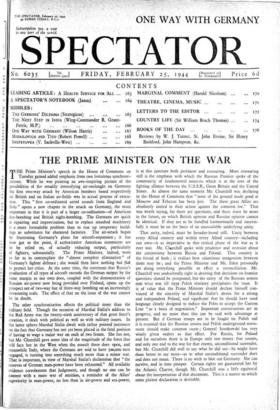THE PRIME MINISTER ON THE WAR
of fighters, substantially. The Prime Minister, indeed, went so far as to contemplate the " almost complete elimination" of Germany's fighter defence ; she would then have nothing but flak to protect her cities. At the same time, the statement that Russia's production of all types of aircraft exceeds the German output by the same margin as our own does, coupled with the demonstration of Russian air-power now being provided over Finland, opens up the prospect not of two-way but of three-way bombing on an increasingly devastating scale. The effect of that on the issue of the war cannot be in doubt.
The other synchronisation affects the political more than the military field. Though the occasion of Marshal Stalin's address to the Red Army was the twenty-sixth anniversary of that great force's creation, it dealt with political as well as with military issues. In the latter sphere Marshal Stalin dwelt with rather pointed insistence on the fact that Germany has not yet been placed in the fatal position of having to wage a major war on each of two fronts. She has not, but Mr. Churchill gave some idea of the magnitude of the force that will face her in the West when the assault there does open, and meanwhile Italy, where the Germans are said to have 500p00 men engaged, is turning into something much more than a minor war. That is important, in view of Marshal Stalin's declaration that " the reserves of German man-power have been exhausted." All available evidence corroborates that judgement, and though no one can be content with a mere war of attrition, a reminder of the Allies' superiority in man-power, no less than in air-power and sea-power, is at this juncture both pertinent and reassuring. More reassuring still is the emphasis with which the Russian Premier spoke of the community of fundamental interests which is at the root of the fighting alliance between the U.S.S.R., Great Britain and the United States. At almost the same moment Mr. Churchill was declaring in the House of Commons that " none of the ground made good at Moscow and Teheran has been lost. The three great Allies are absolutely united in their action against the common foe." That was worth saying, for there are questions, and there must be more in the future, on which British opinion and Russian opinion cannot be identical. If they are to be handled harmoniously and success- fully it must be on the basis of an unassailable underlying unity.
That unity, indeed, must be broader-based still. Unity between every Allied country and within every Allied country—including our own—is as imperative in this critical phase of the war as it ever was. Mr. Churchill spoke with prudence and restraint about the controversy between Russia and Poland. This country is the friend of both ; it realises how calamitous antagonism between them may be ; and the Prime Minister and Mr. Eden personally are doing everything possible to effect a reconciliation. Mr. Churchill was undoubtedly right in desiring that decisions on frontier questions should be postponed, but the entry of the Russian armies into what was till 1939 Polish territory precipitates the issue. It is of value that the Prime Minister should declare himself con- vinced of the sincerity of Marshal Stalin's desire for a strong and independent Poland, and significant that he should have used language clearly designed to induce the Poles to accept the Curzon Line " as a basis of negotiation." Important conversations are in progress, and no more than this can be said with advantage at present. But if German .troops are to be fought on Polish soil it is essential that the Russian armies and Polish underground move- ment should make common cause ; General Sosnkowski has very wisely given orders to that effect. For Russia, for Poland and for ourselves there is in Europe only one enemy that counts, and only one end to the war for that enemy, unconditional surrender, but Mr. Churchill did well to say what he did say—he might have done better to say more—as to what unconditional surrender does and does not mean. There is no wish to blot out Germany. She can survive, and in time prosper. Certain rights are guaranteed her by the Atlantic Charter, though Mr. Churchill was a little equivocal about the interpretation of that document. This is a matter on which some plainer declaration is desirable.


























